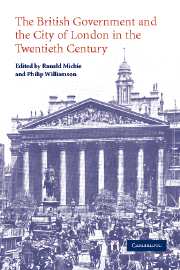Book contents
- Frontmatter
- Contents
- Notes on contributors
- Acknowledgements
- Conventions and abbreviations
- Introduction
- Part I The long perspective
- Part II Markets and society
- Part III Government and political parties
- Part IV The interwar period
- Part V 1945–2000
- 13 Keynesianism, sterling convertibility, and British reconstruction 1940–1952
- 14 ‘Mind the gap’: politics and finance since 1950
- 15 Domestic monetary policy and the banking system in Britain 1945–1971
- 16 The new City and the state in the 1960s
- 17 The Bank of England 1970–2000
- Select bibliography
- Index
16 - The new City and the state in the 1960s
Published online by Cambridge University Press: 04 July 2009
- Frontmatter
- Contents
- Notes on contributors
- Acknowledgements
- Conventions and abbreviations
- Introduction
- Part I The long perspective
- Part II Markets and society
- Part III Government and political parties
- Part IV The interwar period
- Part V 1945–2000
- 13 Keynesianism, sterling convertibility, and British reconstruction 1940–1952
- 14 ‘Mind the gap’: politics and finance since 1950
- 15 Domestic monetary policy and the banking system in Britain 1945–1971
- 16 The new City and the state in the 1960s
- 17 The Bank of England 1970–2000
- Select bibliography
- Index
Summary
During the 1960s the relationship between the City and the state underwent a profound change. Through the 1950s the City had emerged only slowly from the controls of wartime. Commercial banks were cushioned in an oligopolistic environment where competition on interest rates was carefully constrained and there were close links between the City and the state (here used to refer to the Treasury and the Bank of England). Gentlemen's agreements, moral suasion and unilateral edicts were the modus operandi of the Bank of England in their efforts to control the expansion of credit and to protect the exchange rate of the pound through these ‘stop-go’ years. In terms of international finance, sterling policy preoccupied both Treasury ministers and Bank of England officials, and the City usually co-operated with efforts to prop up the pound and to operate the Sterling Area. In the forum of foreign investment the government's Capital Issues Committee vetted all proposals until 1959 and allowed only those whose potential impact on the balance of payments was likely to be positive.
During the 1950s there were two aspects of London's international role that seemed to threaten its prospects, but in the event neither was as important as anticipated. The end of sterling as a reserve currency, predicted in the 1950s to be a death knell for the City, had little lasting impact because it was preceded by the diversification of the City's activities.
- Type
- Chapter
- Information
- Publisher: Cambridge University PressPrint publication year: 2004
- 7
- Cited by



